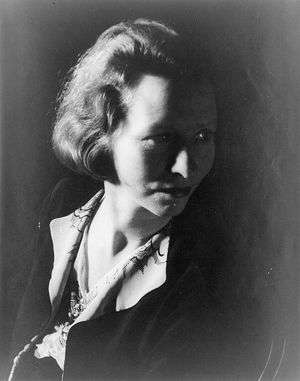Edna St. Vincent Millay

My candle burns at both ends;
It will not last the night;
But ah, my foes, and oh, my friends—
It gives a lovely light!—"First Fig", from A Few Figs from Thistles (1920)
Edna St. Vincent Millay (February 22, 1892 – October 19, 1950) was an American lyrical poet and playwright. She received the Pulitzer Prize for Poetry in 1923, the third woman to win the award for poetry, and was also known for her feminist activism. She used the pseudonym "Nancy Boyd" for her prose work. The poet Richard Wilbur asserted, "She wrote some of the best sonnets of the century."
Millay’s fame began in 1912 when she entered her poem "Renascence" in a poetry contest in The Lyric Year. The poem was widely considered the best submission and when it was ultimately awarded fourth place, it created a scandal which brought Millay publicity -- the winner of the contest publicly asserted that "Renascence" was the best poem, and a second-prize winner offered her his prize money.
Shortly after the Lyric Year controversy, Millay acquired a patron, Caroline B. Dow, who paid for Millay's education at Vassar College.
In 1919 she wrote the anti-war play Aria da Capo, which starred her sister Norma Millay at the Provincetown Playhouse in New York City. Her 1920 collection A Few Figs From Thistles drew controversy for its novel exploration of female sexuality and feminism. Millay won the Pulitzer Prize for Poetry in 1923 for "The Ballad of the Harp-Weaver"; she was only the third woman to win the poetry prize, after Sara Teasdale (1918) and Margaret Widdemer (1919).
During World War I Millay had been a dedicated and active pacifist; however, from 1940 she supported the Allied Forces, writing in celebration of the war effort and later working with Writers' War Board to create propaganda, including poetry. Sadly, her reputation in poetry circles was damaged by her war work. Merle Rubin noted: "She seems to have caught more flak from the literary critics for supporting democracy than Ezra Pound did for championing fascism." In The New York Times, Millay mourned the Czechoslovak city of Lidice, the site of a Nazi massacre:
The whole world holds in its arms today
The murdered village of Lidice,
Like the murdered body of a little child.
In 1943 Millay was the sixth person and the second woman to be awarded the Frost Medal for her lifetime contribution to American poetry.
In 2015, she was named as one of the 31 Icons of 2015's LGBT History Month by Equality Forum.
Works
Millay wrote five verse dramas early in her career, including Two Slatterns and a King and The Lamp and the Bell, a poem written for Vassar College about love between women. She was commissioned by the Metropolitan Opera House to write a libretto for an opera composed by Deems Taylor. The result, The King's Henchman, drew on the Anglo-Saxon Chronicle's account of Eadgar, King of Wessex, and was described as the most effectively and artistically wrought American opera ever to reach the stage. Within three weeks, her publishers had run through four editions of the book.
Her pacifist verse drama Aria da Capo, a one-act play written for the Provincetown Players, is often anthologized. It aired live as an episode of Academy Theatre in 1949 on NBC.
"Euclid alone has looked on Beauty bare" (1922) is an homage to the Geometry of Euclid. "Renascence" and "The Ballad of the Harp-Weaver" are often considered her finest poems. On her death in 1950, The New York Times described her as "an idol of the younger generation during the glorious early days of Greenwich Village [...] One of the greatest American poets of her time." Thomas Hardy said that America had two great attractions: the skyscraper and the poetry of Edna St. Vincent Millay.
The following comprises works published during her lifetime:
Poetry collections
- Renascence: and other poems (1917)
- A Few Figs From Thistles: Poems and Four Sonnets (1920)
- Second April (1921)
- The Ballad of the Harp-Weaver (1922)
- Poems (1923)
- Distressing Dialogues (1924) (Under pseudonym Nancy Boyd)
- The Buck in the Snow, and Other Poems (1928)
- Fatal Interview (1931)
- Wine from These Grapes (1934)
- Conversation at Midnight (1937)
- Huntsman, What Quarry?(1939)
- There Are No Islands, Any More: Lines Written in Passion and in Deep Concern for England, France, and My Own Country (1940)
- Make Bright the Arrows: 1940 Notebook (1940)
- The Murder of Lidice (1942)
- Second April [and] The Buck in the Snow (1950)
- Mine the Harvest, A Collection of New Poem (1954) (This collection consists of the poems that Edna St. Vincent Millay was preparing at the time of her death.)
- Love is Not All
Plays
- Aria da capo (1919)
- The Lamp and the Bell (1921)
- Two Slatterns and a King: A Moral Interlude (1921)
- Three Plays (contains Two Slatterns and a King, Aria da capo, and The Lamp and the Bell) (1926)
- The King's Henchman (1927)
- The Princess Marries the Page (1932)
Films
- Hitler's Madman opens and closes with verses from The Murder of Lidice.
- Bi the Way
- Even the Girls Want Her
- Fiery Redhead
- Sonnet: One of the modern masters of the form.
This page needs more trope entries. You can help this wiki by adding more entries or expanding current ones.